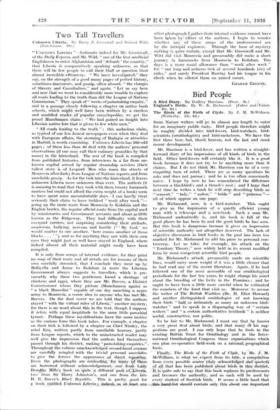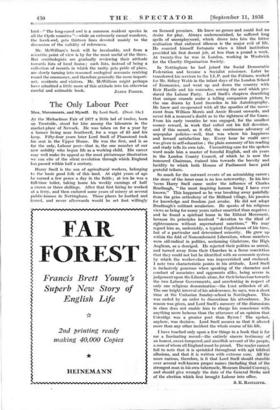Bird People
A Bird Diary. By Godfrey Mariann. (Dent. 6s.)
England's Birds. By W. K. Richmond. (Faber and/Faber. 10s. 6d.) - The Birds of the Firth of Clyde. By S. M. McWilliam. (Witherby. 12s. 6d.) .
SOME Nature writers will go to almost any length, to cater for an imaginary public taste. - Bird people therefore might be roughly divided- into ' bird-loverS, bird-watchers, bird- scientists (ornithologists) and bird-racketeers. We have the first three -here,- but, thank heaven, not the last and most
recent development. -
Mr. Harrison is a bird-lover, and has written a straight- forward diary of his impressions of all kinds of birds in the field. Other bird-lovers will certainly like it. It is a good book because it does not try to be anything more than it claims. But I do not think: Mr. Harrison. can be of a very enquiring turn of mind. There are so many questions he asks and-does not pursue-; and -he is- toe often consciously naive. I hope by, now he has .remembered the difference between a blackbird's and a thrush's nest ;- and I hope that next tithe he writes a book he will stop describing bircla as ." consort," " lady," " suitor," " bride " and " princess "- -all of which appear corrnrre page; _ _ 'Mr. Richmond, now, is a bird-watcher. This ought to give us the impression of a quietly efficient yOrmg man with a teleicope and a notebook. Such a man Mr. Richmond undoubtedly is, and his' book is full of the good places he has been to and the good -birds -he liag' seen. But this book is dangerous because it gives an impression of scientific authority not altogether deserved. The lack of objective 'discussion in bird books in the past has been too marked for Mr. Richmond to add his piece to personal con- troversy. Let us take, for example, his attack on the
Territory Theory," now widely held in its recent modified form by most competent scientific bird people.
Mr. Richmond's attack, presumably made on scientific lines, would carry more weight if it was a little clearer that he had read any of the recent literature. Again, if he had followed one of the most accessible of our ornithological periodicals for the last ten years; he might change his mind about the breeding of the twite in the Pennines ; and he ought to have been a little more careful when he estimated the numbers of the knot that visit us. Moreover, to accuse the writer of The British _Warblers (Mr. H. Eliot Howard) and another distinguished ornithologist of not blowing their birds " ,so intimately- as many an unknown bird- watcher " and to speak in a disparaging way of " certain writers " and " a certain authoritative textbook " is neither useful, constructive, nor polite.
To be fair to Mr. Richmond, I must say that hp knows a very great deal about birds; and that many tif his sug- gestions are good. I can only hope that he finds in the existing British Trust • for Ornithology and in the Inter- national Ornithological Congress those organisations which can plan co-operative field-work on a rational, geographical basis. • Finally, The Birds of the Firth of Clyde, by Mr. McWilliam, is what we expect from its title, a compilation from et'ery possible source' (duly ciekneivile'dged Ad' quoted) of all that has been published about 'birds in ibis district: Ai; is quite safe to sn,y.. that this book replaces its.PredecessOrs and becomes the authority, and as such will be used by every student of Scottish birds. It seems a little hard that
- should contain only -this- about one important
•
bird—" The long-eared owl is a common resident species in all the Clyde counties "—while an extremely casual wanderer, the hawk-owl, gets thirteen lines devoted mainly to the discussion of the validity of references.
Mr. McWilliam's book will be invaluable, and from a scientific point of view is by far the most useful of the three. But ornithologists are gradually reviewing their attitude towards lists of local fauna ; such lists, instead of being a collection of records in which the rarity gets pride of place, are slowly turning into reasoned ecological accounts centring round the commoner, and therefore generally the more import- ant, residents and visitors. Mr. McWilliam might perhaps have admitted a little more of this attitude into his otherwise













































 Previous page
Previous page